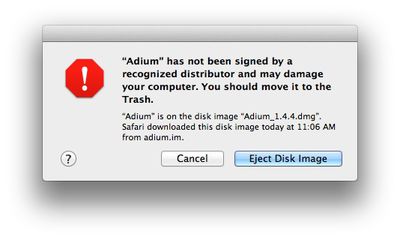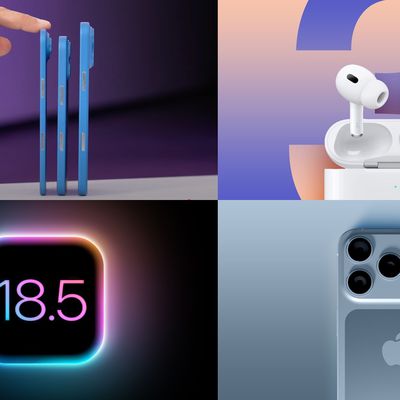Gatekeeper Already Present in OS X 10.7.3, Available for Developer Testing
With developers needing to prepare for Apple's new Gatekeeper feature in OS X 10.8 Mountain Lion, Apple has revealed that the functionality is already baked into OS X 10.7.3 but hidden by default. Apple has instructed developers that they can enable Gatekeeper on OS X 10.7.3 from the command line in order to test the functionality.
Mac OS X users will soon have the option of turning on Gatekeeper, a new Mac OS X security feature. When a user does this, the system provides an additional measure of safety: it blocks that user from opening newly-downloaded applications that are not Developer ID–signed. In this scenario, the same user is easily able to launch downloaded applications that are Developer ID–signed.
By default, Gatekeeper is not enabled in Mac OS X v10.7.3. For testing purposes, you can turn it on by using the new Mac OS X system policy control command-line tool, spctl(8).
Running the command "sudo spctl --enable" in Terminal will enable Gatekeeper on OS X 10.7.3, and the system can be turned off by replacing "enable" with "disable". With the system enabled, developers can then test how their applications will behave on systems using Gatekeeper.
 Warning for non-signed application download with Gatekeeper activated on OS X 10.7.3
Warning for non-signed application download with Gatekeeper activated on OS X 10.7.3Regular users obviously would have little use for activating Gatekeeper on their Lion systems at the present time, as developers have not yet had a chance to begin distributing updated versions of their applications integrating the new Developer-ID functionality. But its inclusion in OS X 10.7.3 is an interesting tidbit that will help developers test their applications with the new program and explains why the
new Xcode 4.3 that supports Developer-ID requires OS X 10.7.3.
In another sign of Apple's desire to quickly implement Gatekeeper, Panic's Cabel Sasser notes that Apple contacted select developers last week to invite them to learn more about the feature.
Popular Stories
While the iPhone 17 Pro and iPhone 17 Pro Max are not expected to launch until September, there are already plenty of rumors about the devices.
Below, we recap key changes rumored for the iPhone 17 Pro models as of April 2025:
Aluminum frame: iPhone 17 Pro models are rumored to have an aluminum frame, whereas the iPhone 15 Pro and iPhone 16 Pro models have a titanium frame, and the iPhone ...
While the so-called "iPhone 17 Air" is not expected to launch until September, there are already plenty of rumors about the ultra-thin device.
Overall, the iPhone 17 Air sounds like a mixed bag. While the device is expected to have an impressively thin and light design, rumors indicate it will have some compromises compared to iPhone 17 Pro models, including only a single rear camera, a...
This week marks the 10th anniversary of the Apple Watch, which launched on April 24, 2015. Yesterday, we recapped features rumored for the Apple Watch Series 11, but since 2015, the Apple Watch has also branched out into the Apple Watch Ultra and the Apple Watch SE, so we thought we'd take a look at what's next for those product lines, too.
2025 Apple Watch Ultra 3
Apple didn't update the...
If you missed the video showing dummy models of Apple's all-new super thin iPhone 17 Air that's expected later this year, Sonny Dickson this morning shared some further images of the device in close alignment with the other dummy models in the iPhone 17 lineup, indicating just how thin it is likely to be in comparison.
The iPhone 17 Air is expected to be around 5.5mm thick – with a thicker ...
Despite being more than two years old, Apple's AirPods Pro 2 still dominate the premium wireless‑earbud space, thanks to a potent mix of top‑tier audio, class‑leading noise cancellation, and Apple's habit of delivering major new features through software updates. With AirPods Pro 3 widely expected to arrive in 2025, prospective buyers now face a familiar dilemma: snap up the proven...
When an iPad running iPadOS 19 is connected to a Magic Keyboard, a macOS-like menu bar will appear on the screen, according to the leaker Majin Bu.
This change would further blur the lines between the iPad and the Mac. Bloomberg's Mark Gurman previously claimed that iPadOS 19 will be "more like macOS," with unspecified improvements to productivity, multitasking, and app window management,...
We've known for quite some time about Apple's plans for a thinner "iPhone 17 Air" coming later this year, but wow, the latest dummy models give us our best look yet at just how thin this phone is going to be.
Other Apple news and rumors this week included another iOS 18.5 beta, the 10th anniversary of the Apple Watch launch, and more management reshuffling in Apple's Siri division, so read...
Starting today, April 24, Apple Stores around the world are giving away a special pin for free to customers who request one, while supplies last.
Photo Credit: Filip Chudzinski
The enamel pin's design is inspired by the Global Close Your Rings Day award in the Activity app, which Apple Watch users can receive by closing all three Activity rings today. The limited-edition pin is the physical...























